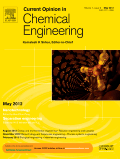
Current Opinion in Chemical Engineering
Scope & Guideline
Fostering impactful discussions for a sustainable future.
Introduction
Aims and Scopes
- Model-Based Process Design:
The journal emphasizes methodologies for model-based design and optimization, particularly in pharmaceutical and biopharmaceutical processes, showcasing advancements in computational tools and data-driven approaches. - Environmental Remediation Technologies:
A significant focus is placed on innovative technologies for environmental remediation, including advanced oxidation processes, photocatalysis, and treatment of per- and polyfluoroalkyl substances (PFAS), reflecting the industry's shift towards sustainability. - Photocatalysis and Energy Conversion:
Research on photocatalytic materials for energy conversion and environmental applications has gained prominence, highlighting the development of novel catalysts and processes for CO2 reduction and hydrogen production. - Intensification and Process Optimization:
The journal covers advancements in process intensification, emphasizing the need for scalable and efficient processes in chemical and biopharmaceutical manufacturing. - Digital Tools and AI in Chemical Engineering:
There is a growing interest in the application of artificial intelligence and digital tools for modeling, process control, and optimization, indicating a trend towards smart manufacturing in chemical engineering.
Trending and Emerging
- Sustainable Chemical Processes:
There is a strong trend towards sustainability, with increasing research on carbon capture, utilization, and the development of green hydrogen technologies, addressing climate change and resource scarcity. - Advanced Materials for Catalysis:
Emerging research on single-atom catalysts, metal-organic frameworks, and novel photocatalysts indicates a shift towards materials that enhance reaction efficiency and selectivity in various applications. - Digitalization in Chemical Engineering:
The integration of digital technologies, including machine learning and data-driven approaches, is gaining traction, facilitating smarter and more efficient process design and control. - Biopharmaceutical Innovations:
The journal is witnessing a surge in articles focused on innovations in biopharmaceutical manufacturing, particularly around model-based optimization and the use of digital tools in process development. - Electrochemical Processes:
Research on electrochemical processes, including electrolysis and advanced oxidation techniques, is increasingly prominent, reflecting a broader interest in energy-efficient and environmentally friendly chemical transformations.
Declining or Waning
- Traditional Chemical Processes:
The emphasis on conventional chemical processes and methodologies has waned as the journal pivots towards more innovative and sustainable approaches, such as electrification and advanced materials. - Low-Tech Water Treatment Methods:
There is a noticeable decrease in publications focused on low-tech water treatment solutions, as the journal increasingly prioritizes advanced and efficient technologies for environmental remediation. - Basic Theoretical Studies:
Research that lacks a direct application or technological advancement, particularly in basic theoretical studies of chemical processes, is becoming less prominent, as the journal seeks to highlight practical and impactful research.
Similar Journals
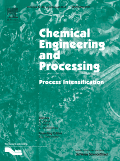
Chemical Engineering and Processing-Process Intensification
Transforming Ideas into Engineering SolutionsChemical Engineering and Processing - Process Intensification is a leading journal published by Elsevier Science SA, specializing in the multifaceted domain of chemical engineering. With the ISSN 0255-2701 and E-ISSN 1873-3204, this journal stands as a beacon of knowledge, facilitating the dissemination of innovative research from 1984 onwards and continuing through 2024. Renowned for its rigorous peer-review process, it boasts a distinguished reputation, reflected in its top-tier rankings within several fields: Q1 in Chemical Engineering (Miscellaneous), Q2 in Chemistry, and Q1 in Industrial and Manufacturing Engineering. This journal focuses on the advancements in process intensification, which are crucial for optimizing efficiency and sustainability in chemical processes. Although access is not open, the journal serves as an essential resource for researchers, professionals, and students alike who seek to advance their understanding and contribute to the evolving landscape of chemical engineering and process technology. Join a community of innovators driving the future of process engineering through impactful and cutting-edge research.

Small Science
Innovating Tomorrow’s Solutions with Today’s ResearchSmall Science is an esteemed open-access journal published by WILEY, dedicated to pioneering research in the realms of catalysis, materials science, and chemical engineering. Established in 2021, this journal has rapidly gained recognition, ranking in the top quartiles (Q1) in various categories, including a remarkable 17th position in Materials Science and 8th in Chemical Engineering on Scopus. With an impact factor reflective of its growing influence and a commitment to disseminating cutting-edge knowledge, Small Science serves as a crucial platform for researchers, professionals, and students seeking to explore the latest advancements and applications in these dynamic fields. The journal's open-access model ensures wide reach and accessibility, facilitating collaboration and innovation across disciplines. Its headquarters are located in the United States, at 111 River St, Hoboken, NJ, supporting a global readership keen on addressing contemporary scientific challenges and driving progress in technology and materials synthesis.

Green Chemical Engineering
Advancing sustainable solutions for a greener tomorrow.Green Chemical Engineering, an esteemed journal published by KEAI PUBLISHING LTD, plays a pivotal role in advancing the field of sustainable chemical engineering. With an Open Access policy since 2020, this journal facilitates the free exchange of cutting-edge research and innovations that address critical environmental challenges. Based in China, it has rapidly gained recognition with impressive category quartiles, ranking Q1 in numerous relevant fields including Catalysis, Chemical Engineering (miscellaneous), Filtration and Separation, and Process Chemistry and Technology. Its presence in Scopus highlights its significance, with top rankings (e.g., Rank #4/19 in Filtration and Separation) placing it in the upper echelons of chemical engineering literature. Designed for researchers, professionals, and students alike, Green Chemical Engineering aims to foster a collaborative platform for the dissemination of pioneering work that contributes to a greener and more sustainable future.
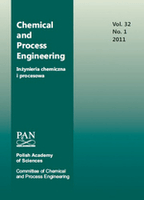
Chemical and Process Engineering-New Frontiers
Bridging Theory and Practice in Chemical EngineeringChemical and Process Engineering-New Frontiers, published by POLSKA AKAD NAUK and the POLISH ACAD SCIENCES, is a premier academic journal dedicated to advancing the frontiers of chemical engineering and chemistry. With an ISSN of 0208-6425 and an E-ISSN of 2300-1925, this journal serves as a crucial platform for disseminating cutting-edge research and innovative practices in the field. Despite its Q4 ranking in both Chemical Engineering and Chemistry categories and a low percentile ranking in Scopus, the journal aspires to enhance visibility and impact in the scientific community through its focus on novel methodologies and groundbreaking studies. Operating as a traditional journal without open access, it aims to connect researchers, professionals, and students, fostering collaboration and knowledge exchange. With a commitment to publishing impactful research, Chemical and Process Engineering-New Frontiers plays an important role in shaping the future of chemical processes and engineering advancements.

Journal of the Pakistan Institute of Chemical Engineers
Transforming Ideas into Impactful Engineering Solutions.The Journal of the Pakistan Institute of Chemical Engineers serves as a pivotal platform for advancing the field of chemical engineering within Pakistan and beyond. Published by the Pakistan Institute of Chemical Engineers, this journal aims to disseminate high-quality research, reviews, and case studies that cover a wide scope of topics relevant to chemical engineering, including process design, environmental technology, and materials science. Although it operates under a non-open access model, the journal is committed to maintaining rigorous peer-review standards to ensure the publication of impactful articles that contribute to the advancement of knowledge and best practices in the discipline. As a hub for researchers, professionals, and students alike, this journal not only fosters academic collaboration but also plays an integral role in shaping the future of chemical engineering in the region. With an ISSN of 1813-4092, it is dedicated to enhancing the visibility and accessibility of chemical engineering research, promoting innovation and education within the field.
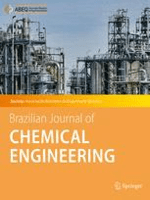
BRAZILIAN JOURNAL OF CHEMICAL ENGINEERING
Empowering Knowledge Exchange in Chemical EngineeringThe Brazilian Journal of Chemical Engineering (ISSN: 0104-6632, E-ISSN: 1678-4383), published by Springer Heidelberg, stands as a prominent open-access journal dedicated to disseminating innovative research and advancements in chemical engineering since its inception in 1997. With a commitment to enhancing knowledge exchange within the field, this journal is indexed in Scopus, earning a respectable Q3 rank in the category of General Chemical Engineering as of 2023. It provides a platform for researchers, professionals, and students to explore a diverse range of topics, fostering collaboration and innovation from its base in Brazil. The journal has converged its operations from 1995 and will continue to push the boundaries of chemical engineering research until 2024 and beyond. As a critical resource for up-to-date methodologies and emerging trends, the Brazilian Journal of Chemical Engineering is essential for those aiming to make impactful contributions in this dynamic and evolving field.

CHEMIE INGENIEUR TECHNIK
Shaping the Future of Industrial Chemistry and Engineering.CHEMIE INGENIEUR TECHNIK, published by WILEY-V C H VERLAG GMBH, stands as a significant academic journal in the fields of Chemical Engineering, Chemistry, and Industrial and Manufacturing Engineering. With an ISSN of 0009-286X and an E-ISSN of 1522-2640, this esteemed journal has been contributing to the body of knowledge since 1949 and plans to continue its legacy until 2024. Notably, the journal holds a Q2 quartile ranking in 2023 across various categories, illustrating its recognized impact and relevance within the scientific community, with Scopus ranks indicating it falls within the top 60th to 51st percentiles of its respective fields. Although currently not open access, CHEMIE INGENIEUR TECHNIK provides readers with comprehensive insights into contemporary research, technological advancements, and practical applications, making it an essential resource for researchers, professionals, and students who are keen to stay abreast of developments in chemical processes and engineering advancements.
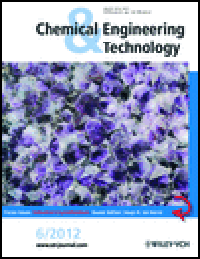
CHEMICAL ENGINEERING & TECHNOLOGY
Innovating Solutions for Tomorrow's ChallengesChemical Engineering & Technology is a prestigious journal published by Wiley-VCH Verlag GmbH, focusing on the evolving field of chemical engineering and its related disciplines. With an ISSN of 0930-7516 and E-ISSN of 1521-4125, the journal has established a robust platform for researchers and practitioners to share pioneering studies and innovative technologies within the field. Classified in the second quartile (Q2) across multiple categories such as Chemical Engineering, Chemistry, and Industrial and Manufacturing Engineering, it holds an impressive rank in the Scopus database, indicating its significant contribution to the academic community. The journal's commitment to advancing knowledge is reflected in its extensive convergence of research from 1987 to 2024, providing a comprehensive archive of scholarly work. Researchers, professionals, and students benefit from the latest insights and findings, enriching the dialogue around chemical processes and methodologies. Though it operates under a traditional subscription model, the accessibility of this journal is crucial for those engaged in both theoretical and applied aspects of chemical engineering.
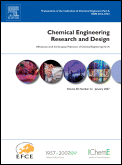
CHEMICAL ENGINEERING RESEARCH & DESIGN
Elevating Research Standards in Chemical Engineering.CHEMICAL ENGINEERING RESEARCH & DESIGN is a prestigious journal that has been at the forefront of dissemination in the fields of chemical engineering and general chemistry since its inception in 1983. Published by Elsevier, the journal features a rich array of research articles that contribute to both theoretical and practical advancements in the discipline. With an impact factor that positions it strongly within the Q2 quartile for both Chemical Engineering and Chemistry categories, it occupies an esteemed place in the academic community, being ranked #77 out of 273 in Chemical Engineering and #111 out of 408 in General Chemistry on Scopus. Researchers and professionals will find it an invaluable resource for cutting-edge research and innovative methodologies that shape the future of chemical engineering applications. While the journal does not currently offer open access, it remains accessible through institutional subscriptions, ensuring that important findings continue to reach a broad audience. With a scope that is poised to expand through 2024, the journal aims to foster collaboration and knowledge sharing, supporting the continuous evolution of the field.
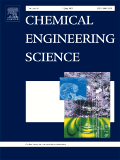
CHEMICAL ENGINEERING SCIENCE
Unveiling Insights that Shape Modern Engineering PracticesChemical Engineering Science is an esteemed journal published by Pergamon-Elsevier Science Ltd, dedicated to advancing the field of chemical engineering through high-quality research and innovation. With a storied history spanning from 1951 to 2025, this journal is recognized as a leading platform for disseminating cutting-edge studies, encompassing a diverse range of topics within chemical engineering, applied mathematics, and industrial engineering. Notably, it holds a prestigious Q1 ranking in several categories, including Chemical Engineering and Industrial and Manufacturing Engineering, indicating its significant impact and influence in these fields. The journal is not open access, yet it maintains a robust readership and is widely cited in academic circles, reflecting its vital role in shaping modern engineering practices. As a vital resource for researchers, professionals, and students alike, Chemical Engineering Science continues to bridge theoretical concepts and practical applications, fostering a deeper understanding of the complex challenges in chemical processes and manufacturing.